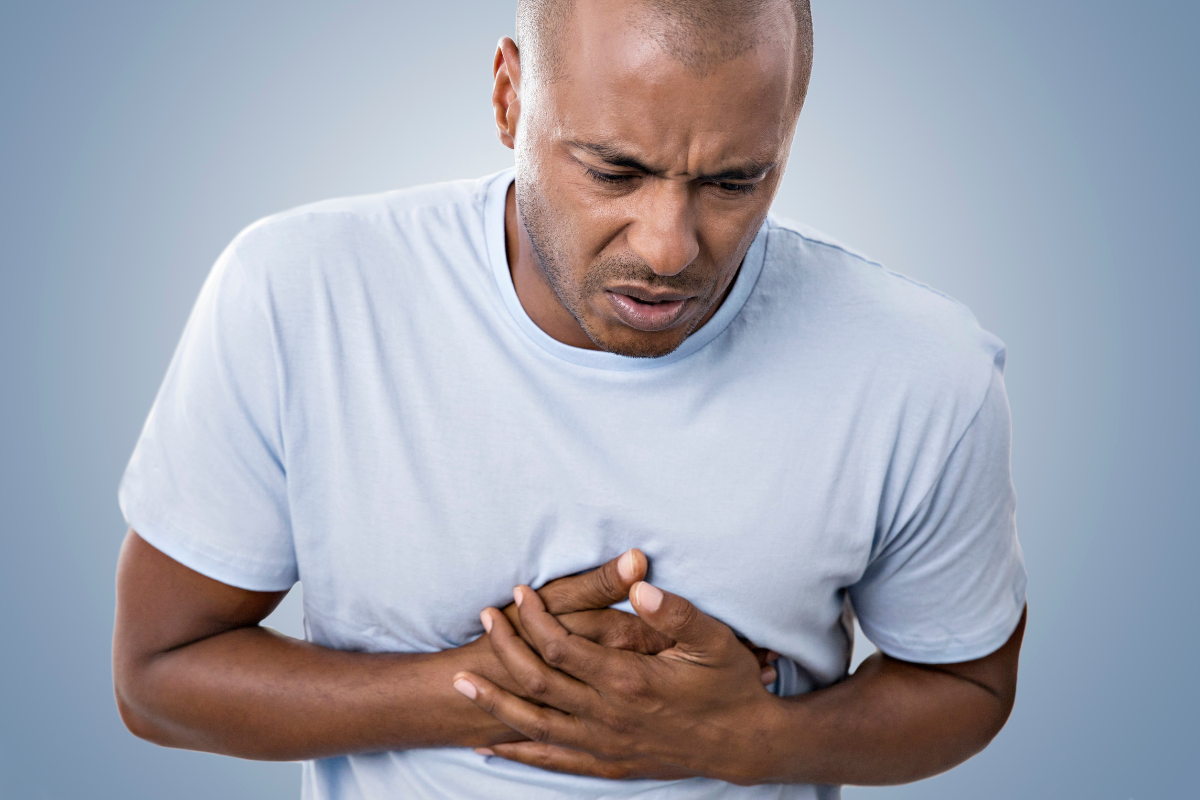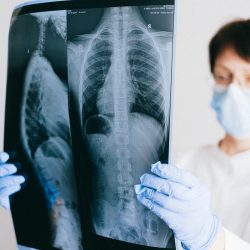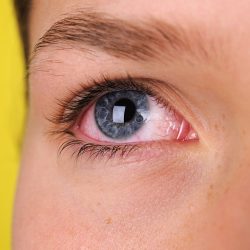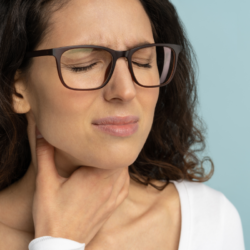Pleurisy or pleuritis is an inflammation of the pleura with or without effusion. When the diagnosis of acute, non-purulent pleurisy is made, its aetiology must be established (history, F.N.S., V.S., intradermal tuberculin reaction, chemistry, cytology, bacteriology of the puncture fluid, etc.). Homeopathic treatment is only possible for infectious, non-purulent serofibrinous pleurisy and traumatic pleurisy. All other causes (tuberculosis, pulmonary embolism, cancer or cancerous metastases, sub-diaphragmatic affections, etc.) will have to receive the appropriate allopathic treatment, homeopathy then being only an adjuvant. Homeopathic treatment will consist of taking, in Hahnemannian dilutions, substances whose pathogenetic experimentation in healthy subjects has caused pleural irritation and an overall reaction mode similar to those observed in patients.
Symptoms of pleurisy and when to consult a doctor
Pleurisy, characterised by inflammation of the pleura, can manifest itself through various symptoms that it is important to recognise:
- Acute chest pain: This is the most common symptom of pleurisy. The pain may be sharp or stabbing, often aggravated by deep breathing, coughing or sneezing.
- Cough: Some patients may develop a dry, irritating cough.
- Shortness of breath: Chest pain can make breathing difficult, leading to breathlessness.
- Fever and Chills: These may occur, often indicating infection.
- Pleural Rales or Rubbing Sounds: Audible on medical examination, these indicate the rubbing of inflamed pleural sheets.
When should you consult a doctor?
It’s vital to consult a healthcare professional if you feel :
- Sharp, persistent chest pain, especially if it worsens with breathing.
- A dry cough that does not improve.
- Symptoms of fever, chills or shortness of breath.
These symptoms may indicate pleurisy or other lung conditions requiring medical assessment and treatment.
What is homeopathy?
Homeopathy is a form of alternative medicine that uses highly diluted natural substances to stimulate the body’s natural healing ability. This treatment approach is based on the principle of “similarity”, whereby a substance that can cause symptoms in a healthy person can also help to cure those same symptoms in a sick person. Homeopathic treatments are individual and personalised for each patient, taking into account their symptoms and medical history.
Onset of acute pleurisy
In cases of infectious origin, we find the medicines for the first stage of inflammation, described elsewhere: Aconitum, Belladonna, Ferrum phosphoricum, which prevent the formation of an effusion.
State period in acute pleurisy
During the state period, the symptoms become characteristic and correspond to the following drugs:
This is the main drug for this disease, the one that corresponds to the most frequent cases. The fever is not very intense, continuous or remittent. The patient is depressed, tired, seeks immobility and is intensely thirsty. The sore spot is aggravated by movement and breathing, improved by pressure and immobility or by lying on the painful side. There may also be a small, dry, painful cough, provoked by the slightest movement.
Auscultation and clinical examination reveal either pleural friction, indicating dry pleurisy, or clear signs of effusion.
Dosage: Take Bryonia 15 CH, 1 dose every 12 hours.
The fever is low. Dyspnoea is aggravated by heat. The cough worsens when lying down and at night. Chest pain is prickly and burning, aggravated by heat. The patient presents with phases of dry, hot skin alternating with phases of perspiration. Oliguria and lack of thirst.
Dosage: Take 9 or 15 CH, 5 granules every 6 hours.
Experiments have shown an action on serous membranes. Cantharis is indicated when the effusion is abundant, accompanied by burning pains improved by heat. There is no characteristic dry cough. Oliguria may be present.
Dosage: Take Cantharis 9 CH, 5 granules 2 to 4 times a day. When pleural effusion is associated with clear signs of oliguria, Cantharis may be alternated with Apis, the 2 drugs having a common pathogenetic tropism for serous membranes and renal parenchyma.
This drug is used for serofibrinous effusions as well as serosanguinous effusions following direct or indirect trauma (post-commissurotomy syndromes, post-Dressler infarct syndrome, which begin with a pericardial effusion).
Dosage: Depending on the symptoms, it may be combined in 9 or 15 CH with one of the above medicines.
Period of resolution in acute pleurisy
In all cases of serbofibrinous pleurisy, during the period of resolution, to promote convalescence, take :
Because of its preferential pathogenetic tropism for serous membranes, this drug promotes resorption of the effusion and prevents the formation of adhesions.
Dosage: Take Sulfur iodatum 7 or 9 CH, 5 granules a day, then 1 dose 3 times a week.
In conclusion, it should be remembered that homeopathic treatment of acute non-purulent pleurisy has only a modest place today. However, it should be emphasised that taking it systematically, as an adjuvant to conventional treatment, has the advantage of shortening the course of the disease and preventing the formation of pleural adhesions.
What good practice can be put in place to help relieve the symptoms of acute non-purulent pleurisy?
There are a number of natural measures that can help relieve the symptoms of acute non-purulent pleurisy. Here are some of them:
- Bed rest: Bed rest is recommended to help reduce chest pain and improve breathing. It is important to get enough rest to allow the body to heal.
- Hot or cold packs: Using hot or cold packs on the chest can help relieve chest pain. Hot compresses can help relax muscles and increase blood circulation, while cold compresses can help reduce inflammation.
- Natural remedies: Natural remedies such as chamomile tea, honey and lemon, can help relieve coughs and improve breathing.
- A healthy diet: A healthy, balanced diet can help boost the immune system and reduce inflammation in the body. We recommend eating antioxidant-rich foods such as fruit and vegetables, and avoiding processed foods and added sugars.
- Good hydration: Drinking enough water can help flush toxins from the body and reduce inflammation in the lungs.
In addition to these natural measures, it is important to consult a qualified healthcare professional for appropriate medical treatment if you develop symptoms of acute non-purulent pleurisy.
Overview of scientific research on homeopathy
Scientific research into the effectiveness of homeopathy has produced varied results over the years. To shed some light on the subject, here is a summary of some notable studies and analyses:
- Recent clinical trials: Up to the end of 2022, 271 randomised controlled trials of homeopathic treatment have been published. These trials cover 144 different health problems. Of these, 43% showed a positive efficacy of homeopathy, 3% a negative result, and 54% were inconclusive (1). These data suggest variability in the efficacy of homeopathy depending on the conditions treated.
- Meta-analysis by Dr Robert Mathie: A meta-analysis of randomised, double-blind, placebo-controlled clinical trials has revealed that homeopathic medicines, when prescribed individually, are 1.5 to 2 times more likely to be beneficial than a placebo. These conclusions, drawn from research carried out between 2014 and 2019, indicate a significant positive result for homeopathy in certain contexts (2).
- The Swiss Report on Homeopathy: Commissioned by the Swiss authorities, this report concluded that homeopathy is effective, safe and cost-effective. It found solid evidence of efficacy, particularly for upper respiratory tract infections and allergic reactions, based on 20 systematic reviews of clinical trials (3).
- Assessment by the French National Authority for Health (HAS ): In France, the HAS has carried out an in-depth scientific assessment of homeopathic medicines. After analysing more than 1,000 scientific publications, the HAS concluded that homeopathic medicines were insufficiently effective to justify reimbursement, particularly for conditions such as anxiety disorders and acute respiratory infections in children (4).
This research shows that although homeopathy may offer benefits in some cases, its effectiveness remains a matter of debate in the scientific community. Further research is essential to obtain more definitive conclusions on the efficacy of homeopathy in specific conditions, such as acute non-purulent pleurisy.
Consult a professional and stay connected
We hope this article has provided you with some valuable information about homeopathy in the treatment of acute non-purulent pleurisy. However, it is important to remember that homeopathy, like any medical treatment, must be tailored to the specific needs of each individual.
Consult a Healthcare Professional: If you or a loved one is concerned about pleurisy or any other health condition, we strongly encourage you to consult a healthcare professional. Only a qualified doctor or specialist can provide you with an accurate diagnosis and a treatment plan tailored to your personal situation.
Stay Informed and Connected: For more information and advice on health and well-being, feel free to follow us on our social networks. We regularly share advice, news and useful information:
- TikTok: Follow us on TikTok for informative and interactive videos.
- Instagram: Join our community on Instagram for health tips and daily updates.
- Facebook: Like our Facebook page to keep up to date with our latest publications and offers.
- Twitter: Follow us on Twitter for regular tweets on health and wellbeing.
Your health and well-being is our priority. Stay informed, stay healthy!
FAQs:
- Can homeopathy cure acute non-purulent pleurisy?
- Although homeopathy can help relieve the symptoms of acute non-purulent pleurisy, it is important to consult a qualified health professional for appropriate medical treatment.
- What homeopathic remedies are commonly used for acute non-purulent pleurisy?
- Commonly used homeopathic remedies for acute non-purulent pleurisy include Bryonia, Aconitum napellus, Kali carbonicum and Phosphorus.
- What natural measures can help relieve the symptoms of acute non-purulent pleurisy?
- Resting in bed and using hot or cold compresses on the chest can help relieve chest pain.
- Is acute non-purulent pleurisy a serious condition?
- Yes, acute non-purulent pleurisy can be a serious condition that requires appropriate medical treatment.
- How can I prevent acute non-purulent pleurisy?
- It’s important to look after our physical and mental health by avoiding risk factors such as smoking, practising good respiratory hygiene and eating a healthy, balanced diet.
Read more:
- (1) https://www.hri-research.org/fr/ressources/homeopathy-faqs/preuves-scientifiques-de-lhomeopathie/
- (2) https://www.hri-research.org/fr/ressources/homeopathy-faqs/ne-considerant-que-les-meilleurs-etudes/
- (3) https://www.hri-research.org/fr/ressources/homeopathie-en-debat/le-rapport-suisse-sur-lhomeopathie/
- (4) https://www.has-sante.fr/jcms/p_3066934/fr/medicaments-homeopathiques-une-efficacite-insuffisante-pour-etre-proposes-au-remboursement






